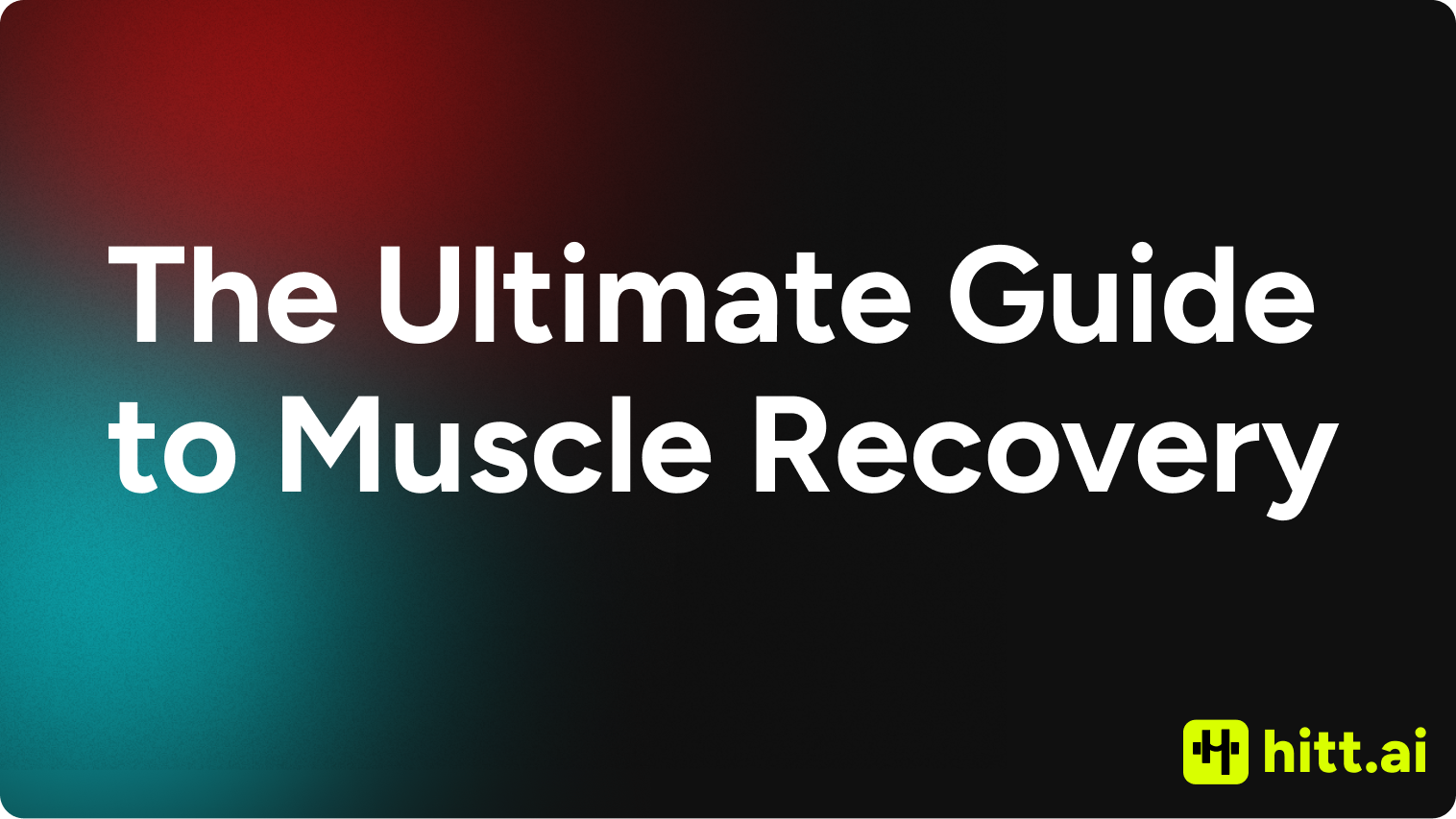
The Ultimate Guide to Muscle Recovery
Alright, fitness fanatics, let's talk about the unsung hero of your workout routine: muscle recovery. We all love crushing it in the gym, but what happens after that final rep? Ignoring recovery is like building a skyscraper on a shaky foundation – eventually, things are going to crumble. So, let's dive into the ultimate guide to muscle recovery and learn how to bounce back stronger than ever!
Why Muscle Recovery Matters (More Than Just Avoiding Soreness)
You might be thinking, "I can handle a little soreness. No big deal." But muscle recovery is about more than just avoiding discomfort. It's about optimizing your body's ability to repair and rebuild muscle tissue, which is essential for making progress and preventing injuries.
Here’s why muscle recovery is a game-changer for your fitness journey:
- Muscle Growth: Recovery allows your muscles to repair and rebuild, leading to increased size and strength.
- Injury Prevention: Proper recovery reduces your risk of strains, sprains, and other injuries.
- Improved Performance: Recovered muscles are stronger and more efficient, leading to better workouts.
- Reduced Fatigue: Recovery helps your body replenish energy stores and reduce fatigue.
- Enhanced Sleep: Proper recovery promotes relaxation and improves sleep quality.
Essential Muscle Recovery Strategies
Let's explore some essential muscle recovery strategies that you can incorporate into your daily routine.
1. Nutrition
What it is: Providing your body with the nutrients it needs to repair and rebuild muscle tissue.
Why it matters: Nutrition is the foundation of muscle recovery. Without the right nutrients, your body won't be able to repair and rebuild effectively.
Strategies:
- Protein: Consume 1.6-2.2 grams of protein per kilogram of body weight per day.
- Carbohydrates: Replenish glycogen stores by consuming complex carbohydrates after workouts.
- Healthy Fats: Support hormone production and reduce inflammation by consuming healthy fats.
- Hydration: Stay hydrated by drinking plenty of water throughout the day.
Pro Tip: Consume a protein-rich meal or snack within 1-2 hours after your workouts to maximize muscle protein synthesis.
2. Sleep
What it is: Allowing your body to rest and repair during sleep.
Why it matters: Sleep is when your body does most of its repairing and rebuilding. Without enough sleep, your recovery will be compromised.
Strategies:
- Aim for 7-9 hours of sleep per night.
- Create a relaxing bedtime routine.
- Avoid caffeine and alcohol before bed.
- Make sure your bedroom is dark, quiet, and cool.
Pro Tip: Establish a consistent sleep schedule to regulate your body's natural sleep-wake cycle.
3. Active Recovery
What it is: Engaging in low-intensity activities to promote blood flow and reduce muscle soreness.
Why it matters: Active recovery helps remove waste products from your muscles and reduce inflammation.
Strategies:
- Light cardio: Go for a walk, swim, or bike ride at a low intensity.
- Stretching: Perform gentle stretches to improve flexibility and reduce muscle tension.
- Foam rolling: Use a foam roller to release tension in your muscles.
Pro Tip: Perform active recovery on your rest days or after intense workouts.
4. Massage
What it is: Manipulating your muscles and soft tissues to reduce tension and promote blood flow.
Why it matters: Massage can help reduce muscle soreness, improve flexibility, and promote relaxation.
Strategies:
- Self-massage: Use a foam roller, massage ball, or your hands to massage your muscles.
- Professional massage: Schedule a massage with a licensed massage therapist.
Pro Tip: Focus on areas that are particularly sore or tight.
5. Cold and Heat Therapy
What it is: Using cold and heat to reduce inflammation and promote healing.
Why it matters: Cold and heat therapy can help reduce muscle soreness, improve circulation, and promote relaxation.
Strategies:
- Ice packs: Apply ice packs to sore muscles for 15-20 minutes at a time.
- Warm baths: Soak in a warm bath with Epsom salts to relax your muscles.
- Contrast therapy: Alternate between cold and warm water to improve circulation.
Pro Tip: Use cold therapy immediately after workouts to reduce inflammation and heat therapy later to promote blood flow.
Track Your Recovery with hitt.ai

Optimize your muscle recovery with hitt.ai. While we're known for AI-powered workout tracking, understanding and managing recovery is crucial for maximizing gains.
Why Use hitt.ai for Muscle Recovery:
- Track Sleep: Monitor your sleep patterns and their impact on recovery.
- Log Nutrition: Track your macronutrient intake to ensure you're fueling recovery.
- Monitor Soreness: Record muscle soreness levels to identify areas needing attention.
- Personalized Recommendations: Receive AI-driven tips for optimizing recovery.
Practical Recovery Routines
Let's put those strategies into some practical recovery routines that you can incorporate into your training schedule.
Post-Workout Recovery Routine (30-60 minutes)
- Nutrition: Consume a protein-rich meal or snack.
- Active Recovery: Perform light cardio and stretching.
- Foam Rolling: Focus on areas that are particularly sore or tight.
- Cold Therapy: Apply ice packs to sore muscles.
Rest Day Recovery Routine (60-90 minutes)
- Sleep: Aim for 8-9 hours of sleep.
- Nutrition: Focus on consuming a balanced diet with plenty of protein, carbohydrates, and healthy fats.
- Active Recovery: Perform light cardio and stretching.
- Massage: Schedule a massage with a licensed massage therapist or perform self-massage.
- Heat Therapy: Soak in a warm bath with Epsom salts.
Weekly Recovery Routine
- Schedule 1-2 rest days per week.
- Prioritize sleep and nutrition.
- Incorporate active recovery and massage.
- Listen to your body and adjust your routine as needed.
Tips for Muscle Recovery Success
Here are some tips to help you make the most of your muscle recovery efforts.
1. Be Consistent
- Habits: Make recovery a consistent part of your routine.
- Schedule: Schedule recovery activities like any other important appointment.
- Reminders: Set reminders to help you stay on track.
2. Listen to Your Body
- Pain: Pay attention to any pain or discomfort you're experiencing.
- Fatigue: Recognize the signs of fatigue and adjust your training accordingly.
- Rest: Take rest days when you need them.
3. Prioritize Sleep
- Quantity: Aim for 7-9 hours of sleep per night.
- Quality: Create a relaxing bedtime routine and make sure your bedroom is dark, quiet, and cool.
- Consistency: Establish a consistent sleep schedule.
4. Fuel Your Body
- Protein: Consume enough protein to support muscle repair and rebuilding.
- Carbohydrates: Replenish glycogen stores by consuming complex carbohydrates after workouts.
- Healthy Fats: Support hormone production and reduce inflammation by consuming healthy fats.
5. Stay Hydrated
- Water: Drink plenty of water throughout the day.
- Electrolytes: Replenish electrolytes lost through sweat by consuming sports drinks or electrolyte supplements.
Common Muscle Recovery Mistakes to Avoid
Let's talk about some common mistakes people make when it comes to muscle recovery and how to avoid them.
1. Ignoring Pain
- Solution: Pay attention to any pain or discomfort you're experiencing and seek medical attention if necessary.
2. Skipping Rest Days
- Solution: Schedule rest days into your training routine and prioritize sleep and recovery activities.
3. Overtraining
- Solution: Avoid pushing yourself too hard and listen to your body's signals.
4. Neglecting Nutrition
- Solution: Fuel your body with the nutrients it needs to repair and rebuild muscle tissue.
5. Skimping on Sleep
- Solution: Prioritize sleep and aim for 7-9 hours of sleep per night.
The Mental Game of Muscle Recovery
Muscle recovery is not just about physical techniques; it's also about mental and emotional well-being. Here are some tips to help you stay mentally strong during your recovery process.
1. Be Patient
- Results: Understand that muscle recovery takes time and be patient with the process.
- Progress: Focus on making small, consistent improvements over time.
- Setbacks: Don't get discouraged by setbacks and remember that they're a normal part of the journey.
2. Practice Self-Compassion
- Kindness: Treat yourself with kindness and understanding.
- Forgiveness: Forgive yourself for your mistakes.
- Acceptance: Accept your body as it is, flaws and all.
3. Stay Positive
- Mindset: Cultivate a positive mindset and focus on the positive aspects of your recovery.
- Gratitude: Practice gratitude for your body's ability to heal and recover.
- Support: Surround yourself with supportive people who can encourage you along the way.
4. Focus on the Process
- Enjoyment: Find enjoyment in the recovery process and focus on the positive aspects of it.
- Mindfulness: Practice mindfulness and pay attention to your body's signals.
- Learning: Use the recovery process as an opportunity to learn more about your body and how it responds to training.
Conclusion
Muscle recovery is an essential component of any well-rounded fitness program. By incorporating these strategies into your routine, you can optimize your body's ability to repair and rebuild muscle tissue, leading to increased size and strength, reduced risk of injury, and improved overall performance.
Ready to take your muscle recovery to the next level? Download hitt.ai and start tracking your recovery efforts today!